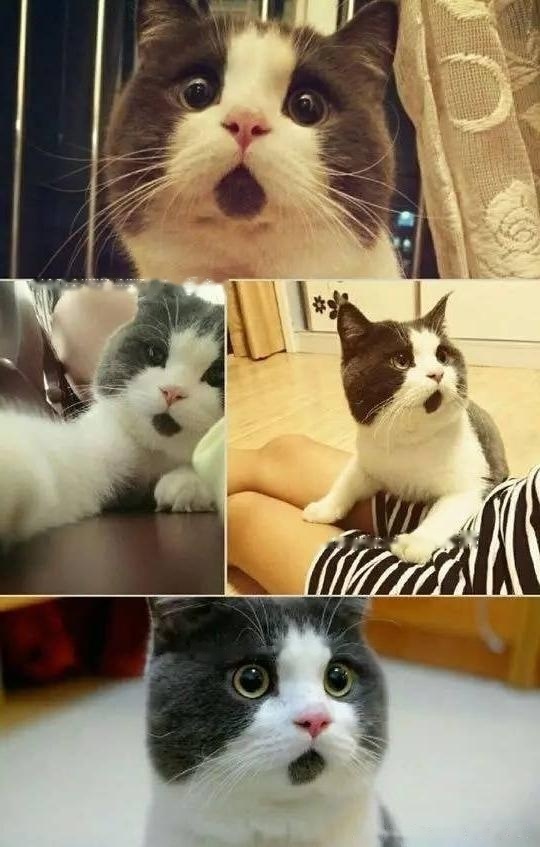There are 3 different blood types in cats: A, B and AB. Among them, type A is very common. It can be said that most cats around us have type A blood. It is said that more than 90% of cats in the United States have type A blood.

Cat blood type secret:
Among breeds, Siamese cats are 100% blood type A, and 90% of Himalayan cats and Maine Coon cats are type A; and Turkish Angora cats and Turkish VansA and B are divided equally;
By contrast, the B type is less evenly distributed, and it can be very common in some breeds. Common, but rare in other breeds. The Abyssinian, Sphynx, German Curl and Cornis Curl are more distributed among the breeds many.
The AB type is a rare blood type in any breed, and it is only distributed in the breeds where the B type exists. So in life, even in the treatment of cats needing blood transfusion, the problem of blood type is not so obvious, unless your cat blood type is very rare.
What determines a cat's blood type?
Human blood type is determined by genes, and so do cats. In cats, the gene that controls blood type A is dominant, while the gene that controls blood type B is recessive, which means that only homozygotes—that is, both blood type genes are B blood genes If the cat has offspring, it can only pass one blood type B gene to its own son or daughter.
The cat with blood type A is different, it may have 2 blood type A genes (professional call this homozygous), but it may also have one blood type A gene and a blood type B gene (professional called heterozygote).
If the cat is heterozygous, half of its offspring will inherit the gene for blood type A, while the other half will receive the gene for blood type B. So if a homozygous blood type A cat finds a blood type B partner, their offspring must be blood type A. As for type AB blood, this is a special case, and the genes that control it are inherited independently.
The current hypothesis is that the AB blood gene is dominant for the B blood gene and recessive for the A blood gene. In short, there are too few cats with type AB blood. In a study in the United States in 1996, among the 9239 cats tested for blood type, only 13 were AB type, accounting for only 0.14%.
You can't go wrong with a cat blood transfusion!
Cats, like humans, have natural antibodies in their bodies, so cat blood types are similar to human blood types. Blood type A is like human type O, and the antibody is less effective in the body; type B is like human type A, and there are antibodies in the body; type AB is like human type AB, and there is no antibody in the body.
Therefore, blood typing and cross-matching tests must be performed before cat blood transfusion to avoid transfusion reactions. Blood transfusion therapy is the best way to treat anemia of various causes. Its clinical application has also received more and more attention. In foreign countries, identification of cat blood type has become a routine diagnosis.
The blood of cats with type B blood contains anti-A antibodies, and in kittens that are only a few months old, the amount of this antibody has reached a very high level. Red blood cells with type A antigens will agglutinate and cause hemolysis.
This usually doesn't happen, though, because cats with type B blood don't have any type A red blood cells at all. However, just like when a person is transfused, if a cat with type B blood is given type A blood, it can be life-threatening.
In addition to blood, antibodies are also present in the colostrum and milk secreted by female cats, so if a newborn kitten with blood type A drinks blood type B on the first day of life The milk of the mother cat, the kitten may absorb a large amount of anti-A antibodies, thereby destroying the original type A red blood cells in the body - this is the legendary newborn animal homologous hemolytic disease, also known as newborn animal. Alloimmune hemolytic anemia.
Therefore, in addition to the wrong blood transfusion, the milk should not be wrongly eaten. Newborn kittens can absorb the antibodies in colostrum through the small intestine within 48 hours after birth.
If two cats with different blood types are mated, and the kittens are born with a different blood type than the mother cat, kittens can develop neonatal erythrolysis (FNI) after absorbing colostrum. In severe cases, a litter of kittens died within a week.
Therefore, it is also necessary to conduct blood type identification before mating, especially for breeds with a large distribution of type B cats. Among cats with type A blood, about 1/3 are born with anti-B antibodies, that is, they will agglutinate with red blood cells with type B antigens. In most cases, however, the levels of B antibodies were low—enough to cause severe hemolytic transfusion reactions, but not high enough to cause allogeneic hemolysis in neonates.
Does a cat's blood type determine its personality?
For cats, does the blood type affect the personality? There is no scientific research to draw conclusions. If you want to judge the personality of your cat by the blood type of the cat, conservatively speaking, it is understandable to do it as a game.
![[Dog Training 5] The training method of pet dog dining etiquette](/static/img/12192/12192_1.jpg)




